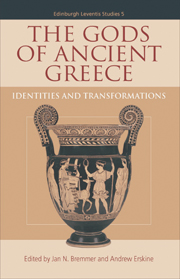Book contents
- Frontmatter
- Contents
- Preface
- List of Illustrations
- Notes on Contributors
- List of Abbreviations
- Introduction: The Greek Gods in the Twentieth Century
- 1 What is a Greek God?
- PART I SYSTEMATIC ASPECTS
- PART II INDIVIDUAL DIVINITIES AND HEROES
- PART III DIACHRONIC ASPECTS
- PART IV HISTORIOGRAPHY
- 25 The Greek Gods in Late Nineteenth- and Early Twentieth-Century German and British Scholarship
- Epilogue
- Index
25 - The Greek Gods in Late Nineteenth- and Early Twentieth-Century German and British Scholarship
from PART IV - HISTORIOGRAPHY
Published online by Cambridge University Press: 05 August 2013
- Frontmatter
- Contents
- Preface
- List of Illustrations
- Notes on Contributors
- List of Abbreviations
- Introduction: The Greek Gods in the Twentieth Century
- 1 What is a Greek God?
- PART I SYSTEMATIC ASPECTS
- PART II INDIVIDUAL DIVINITIES AND HEROES
- PART III DIACHRONIC ASPECTS
- PART IV HISTORIOGRAPHY
- 25 The Greek Gods in Late Nineteenth- and Early Twentieth-Century German and British Scholarship
- Epilogue
- Index
Summary
The late nineteenth and early twentieth centuries constitute a crucial period in the history of the study of the Greek gods. These years witnessed the demise of approaches that had been influential for several centuries and the emergence of others, the impact of which is still felt in the discipline.
In this final chapter I examine both declining and emerging approaches to the Greek gods in German and British scholarship in this period with a primary, although not exclusive, focus on Apollo as a case study. On the German side, I look at one of the last examples of the elemental model of interpretation, as it appears in the work of Wilhelm Heinrich Roscher (1845–1923), and at two alternative theories, the theory of universal gods of Ernst Curtius (1814–96) and the theory of Sondergötter of Hermann Usener (1834–1905). On the British side, I look at the interpretation of the Greek gods in the new context created by anthropology in the last years of the nineteenth century in the work of Lewis Richard Farnell (1856–1934) and Jane Ellen Harrison (1850–1928).
I am particularly interested in the role played by broader cultural and religious factors in the formulation of, and opposition to, models of interpretation of the Greek gods in the scholarship of the period.
- Type
- Chapter
- Information
- The Gods of Ancient GreeceIdentities and Transformations, pp. 483 - 504Publisher: Edinburgh University PressPrint publication year: 2010

